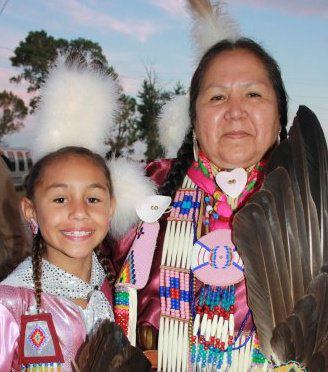“Welcome my daughter, welcome my sister”: An interview with Linda EagleSpeaker
Linda EagleSpeaker works at the Minnesota Indian Women’s Resource Center (MIWRC) in Minneapolis, Minnesota, where she and other staff have integrated mind-body medicine techniques including into community services for at-risk Native populations. EagleSpeaker leads Oshkiniigikwe, a risk-reduction program for girls ages 11-21 which helps them become self-sufficient and stable and reconnect with their cultures. Girls who attend are referred to MIWRC by juvenile justice courts, child welfare departments, or schools. Half of the participants are victims of sex-trafficking.
“My girls lived an unhealthy life with their parents, suffering from PTSD, chemical dependency, homelessness, drug addiction, and domestic violence. The girls are not your average 11 or 14 year old – they’ve already experienced a lot of truancy, runaways, and sexual traumas,” EagleSpeaker said.
Using self-care techniques learned during The Center for Mind-Body Medicine’s (CMBM) professional training program and the CMBM small group model of unforced sharing, EagleSpeaker teaches guided imagery and meditation. She encourages the girls to use drawings, written dialogues, and body movement to express their feelings. In a “Safe Place” exercise, participants envision a comforting scene they can go to when they are under duress. Many of the Oshkiniigikwe girls’ “Safe Place” is an open field of flowers where they happily play with their family pets and are watched over by their grandmothers.
“I do creation philosophy too – when we’re talking about the body and its functions, I relate about our teachings as Native American people intermingled with the Mind-Body Medicine teachings,” EagleSpeaker explains, “At the same time, I’m guiding the girls like the Center taught me, and using the group to share.”

Native girls and women are especially vulnerable to sex trafficking, substance addiction, and domestic violence. EagleSpeaker’s six programs have achieved a sobriety rate of 96% and she is constantly applying for grants to expand MIWRC’s services. She has helped hundreds of women regain their self-confidence, recover from psychological trauma and physical violence, reconnect with their culture, and become productive members of their communities.
“Along with Mind-Body Medicine, I think what’s successful about my program is adding the self-identity piece, reconnecting to your customs, people, traditions, families, tribe. Native people here became so immersed in the city life since they were relocated from reservations six generations ago, and they begin to self-identify with street culture and lose their connection to their people and language,” EagleSpeaker said.
In 2009 MIWRC published a report called Shattered Hearts examining the outcomes of their Healing Journeys program, and MIWRC participated in the Tribal Task Force authorized by The Violence Against women Act of 2005 and helped to pass Minnesota’s Safe Harbor legislation. The Safe Harbor Law is an act to decriminalize girls under 18 as prostitutes. Because of this law when a young girl is arrested, she no longer goes into the criminal system and is penalized because of acts committed by her traffickers and pimps. Instead she is rescued and immediately gets a full medical and mental health workup and goes into child welfare.
EagleSpeaker continued, “The women and girls who come to us have heard time and time again from people on the street or people in corrections how worthless they are. We help them stand tall and proud of being a Native American woman. At first in our groups, none of the girls would give their names. But we have naming ceremonies from elders in the tribes, and now when we sit down, the women will say ‘My name is…’ For myself, I say ‘My name is Linda EagleSpeaker. My spiritual name is Holy Medicine Shining Woman, and I am here to be your sister.’”
Linda EagleSpeaker is one of the first of the Native elders to participate in The Center for Mind-Body Medicine’s comprehensive program of training in mind-body medicine. For more than 20 years, CMBM has worked with populations traumatized by war, natural disaster, and poverty, for whom historical trauma is a living, daunting reality. CMBM is working with Linda and other tribal elders to create a program for trafficked girls and women from tribes in the Midwest and Canada.
The interview was conducted by CMBM staffer Amberjade Mwekali-Tsering.
